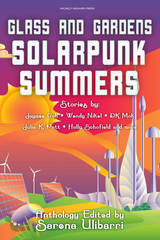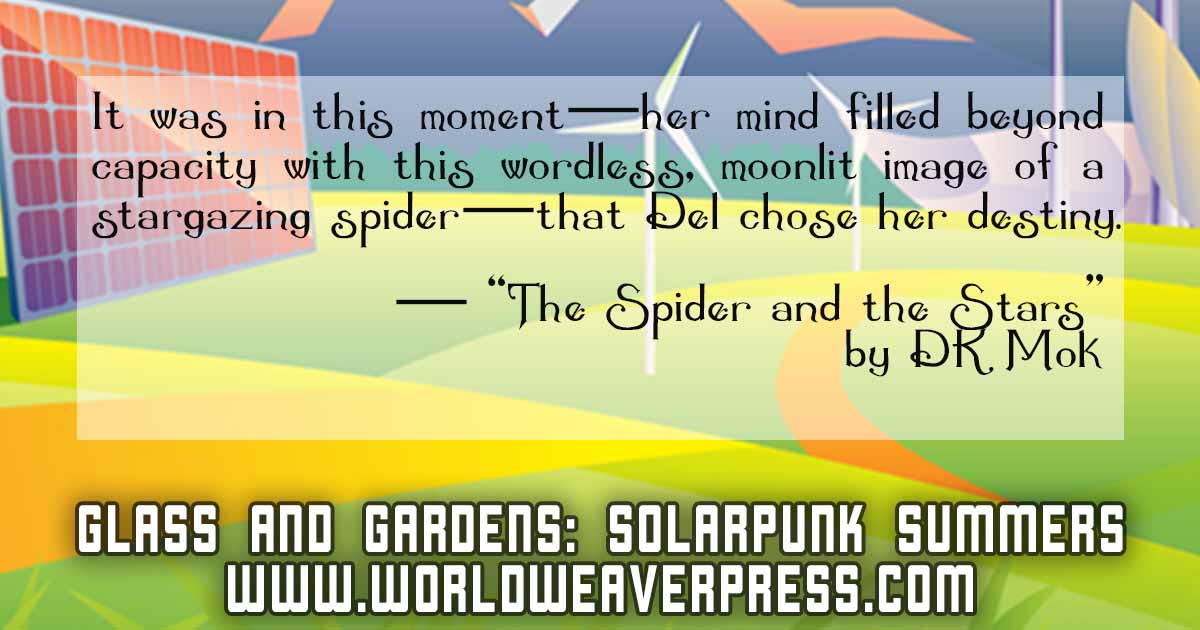 by DK Mok Having grown up in Australia, I have a healthy respect for spiders. It’s a respect that occasionally veers into alarm if a furry huntsman spider scuttles across the bathroom ceiling, or if a leggy mystery spider peers out from behind the TV. However, over the years, that respect has turned increasingly into fascination and affection. It’s hard not to be charmed by splendidly dressed peacock spiders, especially when they’re described as weighing the same as a raindrop. Or to be intrigued by the diving bell spider which carries air bubbles to breathe underwater. I still remember the day I first heard the term "arachnologist" and decided it was one of the coolest titles a profession could have. More recently, I was awestruck when I read an article in National Geographic commenting that the ogre-faced spider has eyesight so sensitive that it can see the Andromeda Galaxy. In my short story "The Spider and the Stars", a young woman is equally struck by this captivating image and dedicates her life to investigating the diverse talents of not only spiders, but of all things creepy crawly. In particular, she’s compelled by the potential of biomimetics: developing new technologies inspired by the abilities and properties of living organisms. From termites and their climate-controlled monoliths to the complicated locomotion of spiders, nature is a sometimes brilliant, sometimes eccentric, engineer. Many of the challenges currently faced by humanity might be solved by taking a closer look at our planet’s tiniest inhabitants. Only a few years ago, it was discovered that the nanoscale pillars on cicadas’ wings have remarkable antimicrobial properties, which could pave the way for self-sterilising medical equipment. We often swat and spray and squish without thought, and it’s true, no one likes a plague, or an unwelcome visitor in the privy. But the more we learn about insects and spiders, the more we can appreciate the incredibly rich, complex and varied lives they lead. And, as our gaze turns towards distant galaxies, hopefully we’ll grow to understand how our own future is inextricably entwined with theirs. DK Mok is a fantasy and science fiction author whose novels include Squid’s Grief and Hunt for Valamon. DK has been shortlisted for four Aurealis Awards, two Ditmars and a WSFA Small Press Award. DK graduated from UNSW with a degree in Psychology, pursuing her interests in both social justice and scientist humour. DK lives in Sydney, Australia, and her favourite fossil deposit is the Burgess Shale. Connect on Twitter @dk_mok or www.dkmok.com.
0 Comments
Your comment will be posted after it is approved.
Leave a Reply. |
World Weaver PressPublishing fantasy, paranormal, and science fiction. Archives
February 2024
|
- Home
-
Books
-
All Books
>
- Beyond the Glass Slipper
- Bite Somebody
- Bite Somebody Else
- Black Pearl Dreaming
- Cassandra Complex
- Causality Loop
- Clockwork, Curses, and Coal
- Continuum
- Corvidae
- Cursed: Wickedly Fun Stories
- Dream Eater
- Equus
- Fae
- Falling of the Moon
- Far Orbit
- Far Orbit Apogee
- Fractured Days
- Frozen Fairy Tales
- Glass and Gardens: Solarpunk Summers
- Glass and Gardens: Solarpunk Winters
- Grandmother Paradox
- Grimm, Grit, and Gasoline
- Haunted Housewives
- Heir to the Lamp
- He Sees You When He's Creepin': Tales of Krampus
- Into the Moonless Night
- Jack Jetstark's Intergalactic Freakshow
- King of Ash and Bones (ebook)
- Krampusnacht
- Last Dream of Her Mortal Soul
- Meddlers of Moonshine
- Mothers of Enchantment
- Mrs Claus
- Multispecies Cities
- Murder in the Generative Kitchen
- Recognize Fascism
- Scarecrow
- Sirens
- Shards of History
- Shattered Fates
- Skull and Pestle
- Solarpunk (Translation)
- Solarpunk Creatures
- Solomon's Bell
- SonofaWitch!
- Speculative Story Bites
- Trenchcoats, Towers, and Trolls
- Weredog Whisperer
- Wolves and Witches
- Anthologies and Collections
- Novels
- Novellas
- Fairy Tale
- Fantasy
- Romance
- Science Fiction
- Urban/Contemporary Fantasy
- Young Adult SFF
-
All Books
>
- Blog
- About
- Contact
- Press / Publicity
- Newsletter Signup
- Privacy Policy
- Store


 RSS Feed
RSS Feed